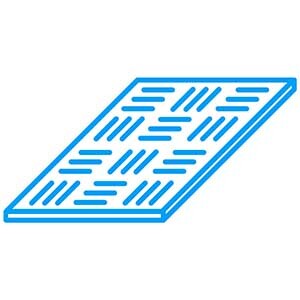Steel Tear Sheets
1 Product(s)Tear plates overview
Tear plates, also known as checker plates, are steel sheets with a characteristic tear or corrugated structure on the surface. This structure offers an excellent Slip resistance and is often used in industrial, commercial and construction applications to ensure safety and stability.
Technical specifications
Tear plates are available in various material grades, with S235JR (W. No. 1.0038) being one of the most common options. These sheets comply with the technical delivery conditions according to EN 10025-2 and the dimensional standards after EN 10363. Standard dimensions include:
-
1.000 x 2.000 mm (K)
-
1.250 x 2.500 mm (M)
-
1.500 x 3.000 mm (G)
Custom widths and lengths are also available for specific requirements.
Weight table
The thickness of the tearplates varies, which affects their weight per square meter. Here is a weight table for different thicknesses:
-
3 mm: 26 kg/m²
-
4 mm: 34 kg/m²
-
5 mm: 42 kg/m²
-
6 mm: 51 kg/m²
-
8 mm: 67 kg/m²
These variations enable flexible adaptation to different load requirements and applications
Possible applications
The tear plates' unique surface structure makes them ideal for applications where slip resistance and durability are critical. The most common areas of application include:
-
Floor coverings: Especially in areas with high Danger of slipping, like Workshops, factory halls and stairs.
-
Vehicle construction: For non-slip loading areas and steps in commercial vehicles.
-
Construction industry: As non-slip surfaces on construction sites and scaffolding.
Advantages
Tear plates offer a number of advantages that make them a preferred choice in various industries:
-
Slip resistance: The textured surface minimizes the risk of slips and falls.
-
Robustness: Made from high-quality steel alloys, they offer good durability against mechanical stress.
-
Versatility: They are available in a variety of sizes and thicknesses, making them suitable for diverse applications.
Discover the versatile possible uses and robust properties of our tear plates. Contact us for customized solutions and offers tailored exactly to your needs.
